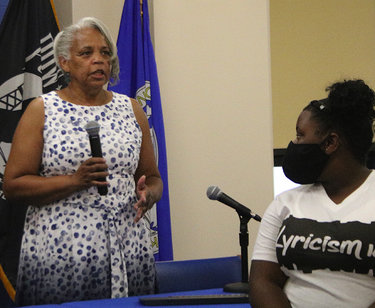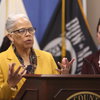Communities ‘under attack’ need help, says chair of pandemic task force
The Enterprise — Michael Koff
Albany County Legislator Wanda Willingham, left, spoke this summer at a county press briefing, saying the Lyricism 101 program, with a music mobile van traveling to city neighborhoods for residents to record music, “is going to benefit the community not just with recreation but also education.”
ALBANY COUNTY — “Jobs. Jobs. Jobs.”
That, says Wanda Willingham, is the key to economic recovery.
Willingham chairs a task force of three county legislators that has been hearing testimony from local business owners, chambers of commerce, and business-improvement districts to understand the impact of the pandemic on local businesses. The task force hopes to produce a report on its findings by the end of the month.
Willingham has represented Albany’s Arbor Hill, District 3, since 1999; she’s the legislature’s deputy chair and a founding member of its Black Caucus.
“What we need to do right now is boost our job creation,” Willingham told The Enterprise on Wednesday. “The stressed communities are really under attack in terms of how they’re living.”
The pandemic, Willingham said, has brought into stark relief the inequity in communities across the county.
In her community, she said, “A lot of people are found dead at home.” Even before the pandemic, they were unable to get the health care they needed. People already suffering from illnesses like diabetes or asthma are then more prone to succumb to COVID-19.
“It’s a domino effect because of the way Black people or people of color were living,” she said. The pandemic, Willingham said, should “show people we can’t continue to live like this … Albany County will not survive unless we look at the poorest first.”
Willingham described food drives run by churches in her community that have cars lined up around the block and said she had never seen anything like it in her lifetime. She said she loads up her own car to make food deliveries to the homebound “to make sure people have food.”
“It’s rougher than you think,” she said.
Asked if she thought the stresses from lack of jobs and health care, coupled with the ravages of the pandemic, are related to the spike in gun violence in Albany, Willingham hesitated a long time.
Finally, she said, “The condition people find themselves in, some of it might be hopelessness.” She also said, “A lot of mental-health issues are coming to the forefront now.”
Willingham went on, “It’s hard to pinpoint … A lot of these people come from good families. People now carry guns that never did before,” she said, because they are afraid for their safety.
“It’s very hard to talk about,” Willingham said, concluding, “We’re in a state of shock ourselves.”
The task force
“It’s a workhorse, not an unwieldy showhorse,” said member Jeff Perlee of the task force. He is one of the three members.
Perlee, elected to the legislature this year, is the sole Republican on the committee and the only one representing a rural area. His District 31 includes Altamont and Guilderland Center as well as part of the Hilltowns.
He said of the other two task-force members, “They bent over backwards to understand how the pandemic affects rural areas.”
The third member is Matthew Peter. He was appointed in 2019 to represent District 5, which comprises Center Square, Pine Hills, Washington Park, and Park South in Albany.
“We worked very well together,” said Willingham of the task force members.
The testimonies made clear, Willingham said, that the pandemic has had a “big impact” on the county.
“It opened my eyes to see that Albany is a rural county, too.,” said Willingham. “We cannot ignore places like Berne and Knox and Coeymans.”
Perlee invited three local business owners to testify: Laurie Beckmann who runs the Appel Inn, an event venue in Guilderland Center, as well as a travel agency; Gary Kleppel, a University at Albany professor emeritus who has a sheep farm in Knox and chairs the town’s Agricultural Advisory Committee; and Nikki Salisbury, who owns a dog-grooming business in the hamlet of Knox.
“From Gary’s and Laurie’s testimony, we learned, in agricultural tourism, they had the ability to establish direct-to-consumer relationships,” Perlee said.
Marketing without a middleman, he said, left them better positioned, for example, when a Cobleskill slaughterhouse shut down, disrupting the supply chain.
Willingham said that, although there was a “Shop Local” campaign promoted by the county, “I wish we had done more … to push people out to certain areas.” Instead of just “shop local,” she said, the campaign should be to “shop small businesses in your neighborhood.
Another thing that Perlee said he learned from the testimonies was businesses “did not necessarily take advantage of federal programs … There was a lot of anxiety and intimidation.”
He also said it was news to him that many urban businesses don’t have established relationships with bankers.
“In the newer American communities, there’s sort of an aversion to government debt,” said Perlee. “They don’t want to open up their books,” he said, so there are barriers to fully participating in programs that might lend aid.
While the county can’t provide direct financial help to businesses, Perlee said, “What we could do is bridge those gaps to help local businesses take advantage of federal programs … People might be more comfortable interacting with the county,” he said, envisioning Albany County as guiding and advising businesses.
While chambers of commerce and business-improvement districts served as a bridge to programs for their members, someone like Salisbury, with her dog-grooming business in Knox, “had no association she could turn to.” Perlee said, “The county could fill that gap.”
Similarly, Willingham said of the county, “We don’t have any extra money … We should prioritize small businesses in the upcoming budget. We did find a lot of small businesses were lacking in technical assistance. We can provide that moving forward.”
Planning ahead
The task force, said Perlee, has a two-pronged purpose: “What can we do immediately in response to the crisis? What can we plan for the future to be better prepared to weather future disruptive events?”
Perlee has been struck, he said, with how changes brought about by the pandemic could be used to develop tourism in the Helderberg area.
“We may have an opportunity as people’s ideas of vacation or how to use their leisure time has changed,” he said. Rather than getting on an airplane, he noted, people are vacationing closer to home.
“They still feel the desire to get out of the house … There have been large upticks at the Christman Preserve and Thacher Park,” said Perlee, who sees his role as asking, “How can the county connect consumers with newfound interests to doing something close to home?”
Perlee noted that governments are dependent on businesses for sales-tax revenues. He said Crossgates Mall, located in Guilderland that draws regional customers, “has been our backbone in Albany County.”
With more online shopping, accelerated by the pandemic, he said, “As that is dispersed through Amazon … we lose in the future a major advantage for Albany County.”
The sales-tax revenues, drawn from regional as well as local shoppers, have gone partly to the state, partly to Albany County, and partly to the county’s municipalities based on population.
Without federal aid to reimburse state and local governments, Perlee said, the county will face difficult choices as it drafts its budget.
“The stimulus steps have not been enough,” said Willingham of federal funds. “As we continue to try to reopen, we have to be concerned with upticks,” she said, as the county is daily reporting more COVID-19 cases than it did over the summer and clusters are emerging in other parts of the state.
Without more federal funds coming in, Willingham said, “We may have to bite the bullet on some of it.” But not on education, she stressed.
A recent Urban Institute report placed Albany as one of the worst cities for racial segregation and poverty gaps. Asked about this, Willingham said, “It’s obvious that we have some issues in regard to how we’re set up to live.”
She went on, “We’re already behind. We have racism in every facet of life. That’s how we live.”
With massive cuts in the Albany City schools, for example, many students are learning remotely from home. “Parents need to be taught virtual learning,” said Willingham. “They’re becoming their kids’ teachers. A lot are not qualified.”
She noted problems with the graduation rate in city schools, prior to the pandemic. “If our kids can’t navigate virtual learning, they’ll be further behind,” she said.
Willingham noted problems with housing, too. She referenced “all the red Xs” — signs that are placed on condemned structures. “We have reduced housing stock,” she said.
Willingham sees jobs as the solution to many of these ills. She referenced the Comprehensive Employment and Training Act, a 1970s federal program — run through state and local governments — that trained out-of-work people for jobs in public service.
“When we came out on the other end of what the country was going through, people had a trade that was useful for them and the community,” said Willingham of the program.
She was pleased that part of a summer youth employment program in Albany County, which she said had been “dead in the water,” was salvaged.
Willingham went on, “Now, we have a lot of people on food stamps … The labor department will count someone as working, with a part-time job. That’s not fair … You can’t support a family on that.”
She also noted that often, when people lose their jobs, they lose their health insurance.
Willingham also said, “When you have a mother working a full-time job and a part-time job to sustain the household, the kids will suffer.”
She concluded, “Economic development is going to be critical in the upcoming year to get back on sure footing … I think about everybody, not just my community. That’s why these small businesses are very important. We need to work together.”



